Live blog: Global Refugee Forum -- Day 2
The second day of a global gathering on refugees kicks off in Geneva, aiming to bolster the global response and foster inclusion.
The 'Everyone Counts' exhibition at the United Nations Office in Geneva, Switzerland.
© UNHCR/Mark Henley
The first Global Refugee Forum comes at the end of a tumultuous decade in which the number of refugees worldwide has doubled to well over 25 million.
From 16–18 December, the international community is coming together to announce bold, new measures to ease pressures on host countries, enhance refugee self-reliance, and find lasting solutions for those uprooted from their homes by wars and persecution.
Check back here throughout the day for updates from Day 2:
‘Young people have the power to change the world’
Among around 80 refugees making their voices heard at the Forum is Foni Joyce Vuni, of UNHCR’s Global Youth Advisory Council.
“When refugees are empowered,’ she says, "they not only change the countries where they are seeking asylum, but also their countries of origin.” Foni is originally from South Sudan.
✅ Engaging refugee youth
— UNHCR, the UN Refugee Agency #RefugeeForum (@Refugees) December 17, 2019
✅ Empowering them and investing in them
🗣️ Listen to the powerful words of our Global Youth Advisory Council co-chair Foni Joyce Vuni at the Global #RefugeeForum. pic.twitter.com/xLYOcZqkmc
Joining up humanitarian, development and peace building efforts
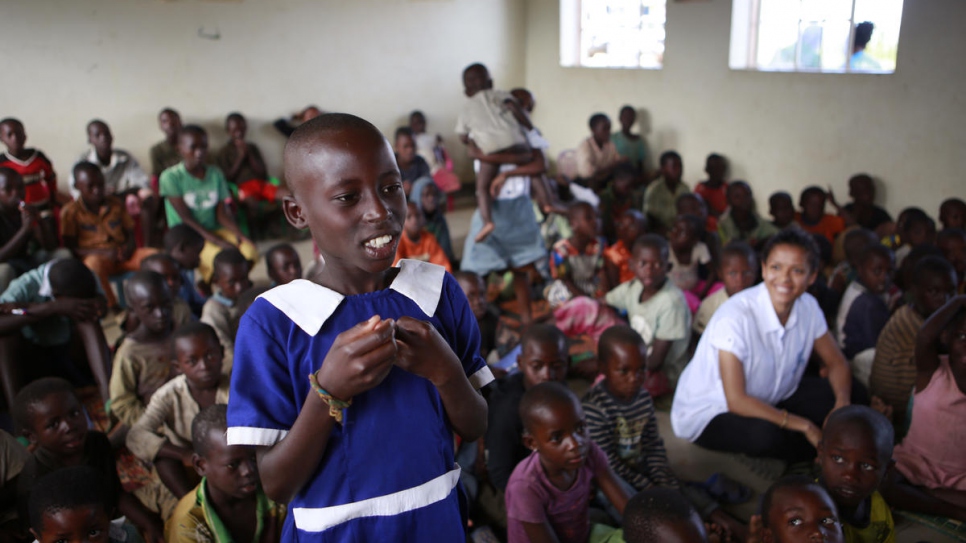
Refugee children attend primary school in Kabazana Reception Centre, Nakivale Refugee Settlement, Uganda. © UNHCR/Caroline Irby
The Forum today heard about the importance of responses that increase the collaboration between humanitarian, development and peace actors.
Jointly organised by Uganda, Japan, UNHCR, the UN Refugee Agency, UNDP, OECD and the World Bank, all members of the main panel stressed the importance of including refugees in national planning and investing in both humanitarian and development aid.
Jennifer Namuyangu, the Ugandan Minister of State for Local Government, highlighted the county’s unique refugee model, which promotes action for both refugees and host-communities as essential to ensuring their peaceful co-existence.
As part of this, refugees have access to all national services and are included in national planning and statistics. This has revealed that while refugees have similar rates of access to basic services as Ugandans, about half of the refugee population is still living in poverty compared to 17 per cent for the host community, focusing the Government on the need for refugees to be able to work and support themselves.
Access to education is also a priority, with 70% of unemployed refugees being 25 and under and with no formal education. Increasing access, however, places strains on the country – with one primary school having over 7,500 students from 60 different nationalities.
Jordan has given over 160,000 work permits to Syrian refugees but also feels similar pressures on schools. Director of International Relations and Organizations at the Ministry of Foreign Affairs, Ambassador Khaled al-Shawabkeh, noted the country has enrolled 140,000 Syrian refugees in public schools – meaning many operate in double and triple shifts, increasing pressure on teachers.
Both countries and all of the main contributors stressed that international support must be maintained for countries that work to include refugees in their national systems, and that humanitarian and development agencies must keep working to coordinate their efforts.
Refugee women discuss sexual and gender-based violence
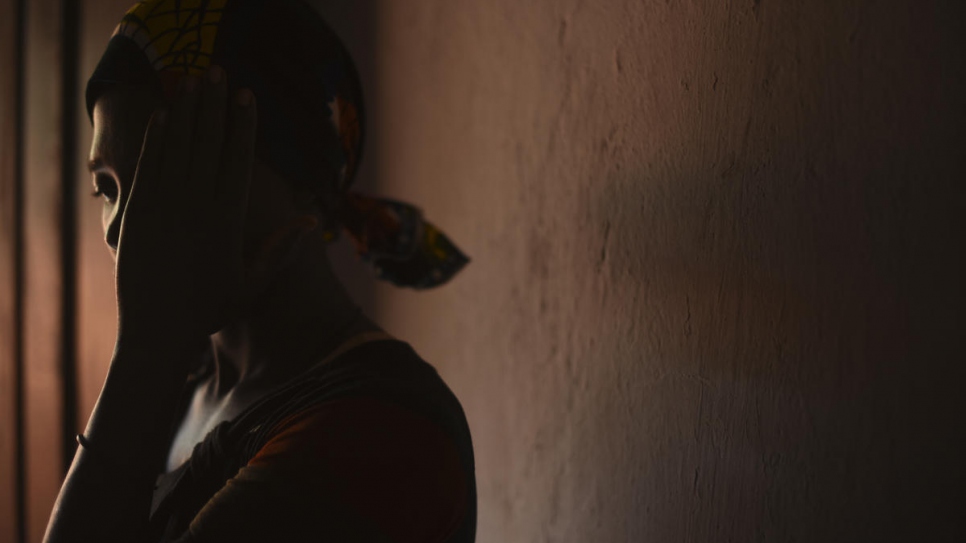
A Burundian refugee and survivor of sexual violence finds safety in Tanzania. © UNHCR/Benjamin Loyseau
In a dynamic session on day two of the Forum, refugee women have led discussions on sexual violence against women and children.
The World Health Organisation estimates that one in five women and children in refugee or internal displacement situations have experienced sexual violence.
The session asked whether humanitarian actors and host countries are listening – and acting.
Panelists noted that while comprehensive law and policy should protect refugee women and girls, many continue to suffer endemic rape and other forms of violence. The lasting impact of this violence cannot be underestimated. Beyond the physical injuries are the deeper traumas, shame and stigma, as well as vulnerability to exploitation – barriers which impact women and girls’ inclusion in education, jobs and society.
"We need to call a crime a crime,” said Athalia Lesiba Molokomme, Ambassador of Botswana to the United Nations Office in Geneva. “Let's call it by its name, rape is a crime. Let's take it out of the shadows. It’s a crime against the integrity and dignity of women. It makes the survivors feel ashamed and this is why it must be mainstreamed into our interventions, including the refugee space.”
One of the main messages from the session was that refugee women and girls should not be regarded as passive victims. They need to be part of the solution.
"I think women and girls are strong enough to contribute to their communities,” said Hafsar Tameesuddin, a former Rohingya refugee now living in New Zealand. “They aren't merely the ones to be rescued – and need to be given a voice in helping them defend themselves. Only by inclusion will we become stronger, not with exclusion."
Hafsar added that finding refuge in a host country does not necessarily ensure security and underlined the need to provide safe spaces, psychosocial care and inclusion for women and girls, in finding ways to end the violence.
Expanding refugee access to resettlement and other third-country solutions

Syrian refugee Hani (right) shares a joke with decorator Trevor in Devon, UK, where he was resettled with his family in 2017. © UNHCR/Andrew McConnell
Creating opportunities to lead meaningful lives for some 25.9 million refugees worldwide is at the top of the agenda of the three-day Forum.
One key approach is to open new avenues for refugees in host countries where they first sought safety to move to third countries, whether through resettlement or other pathways such as the opportunity to work, study or reunite with family members.
This was the focus of a session this afternoon on achieving the vision of the Three-Year Strategy (2019-2021) on Resettlement and Complementary Pathways, which showcased what can be achieved with concerted action and drew new pledges from states and other actors to expand their efforts in this area.
A first panel on growing resettlement heard the lessons learned from Brazil in establishing its resettlement programme and more recent efforts to expand the scheme to benefit refugees and migrants from Venezuela.
“The voluntary internal relocation of Venezuelans is a success case that inspires us to resettle refugees from other nationalities,” said Maria Hilda Marsiaj Pinto, National Secretary of Justice of Brazil. “We are currently preparing to launch Brazil’s first-ever community sponsorship initiative.”
The European Commission also outlined efforts to expand safe and legal pathways to the European Union, where resettlement has tripled since 2015.
“Resettlement is a practical demonstration of EU solidarity with vulnerable refugees and we are committed to continue efforts to expand resettlement places through funding and operational support," said Davinia Wood, Head of Unit for International Strategy in the European Commission. "In 2020, EU funding will directly support EU Member States to resettle around 30,000 refugees.”
Refugees themselves also shared their views on the positive impact of resettlement, both on themselves and the communities that received them.
A second panel looked at advancing complementary pathways, and in particular the role of labour mobility pathways in providing safe access to third countries for refugees while also harnessing their skills and talents. Canada shared its experiences in opening up new routes for refugees, in particular through its economic migration stream.
“With family and education complementary pathways in place, Canada has already demonstrated an ability to deliver,” said Catherine Scott, Director General, Refugee Affairs Branch, Immigration, Refugees and Citizenship Canada.
“Canada will provide World University Service of Canada with funding to expand educational pathways for refugees between 2019 and 2021, and will continue to explore the accessibility of immigration programs for refugees with the launch of the second phase of the Economic Mobility Pathways Project.”
Alleviating extreme poverty amongst refugees and host communities
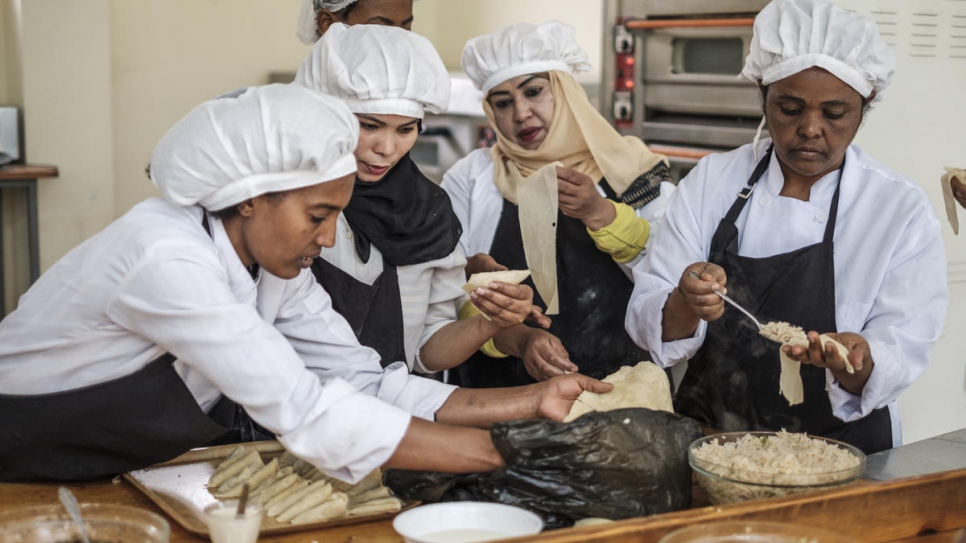
Yemeni refugee Hanan (second from right) prepares samosas on a cooking course at a college in Addis Ababa, Ethiopia. © UNHCR/Eduardo Soteras Jalil
Self-reliance is key for refugees and their hosts to lead a dignified life in safety. Yet, the majority of refugees and their hosts live in low income countries with little economic opportunity, pitching many into the so-called ‘poverty trap’.
Some of the world’s leading experts on poverty alleviation met at the Forum today to identify concrete ways to give millions of vulnerable and extremely poor refugees, and their hosts, their best shot at becoming self-reliant.
A key strategy highlighted in the discussion was the ‘Graduation Approach,’ a sequenced, multi-sector intervention that seeks to lift the poorest and most vulnerable households out of extreme poverty within a specified period by achieving a sustained income.
"In addition to providing assets such as livestock and agriculture inputs, the Graduation Approach supports programme participants with livelihood and financial skills training, personal coaching, connections to health care and education for families, promotes savings and more," said BRAC spokesperson Lewis Temple.
The method combines covering the household’s basic needs – such as food – while the breadwinner of the household goes through training, mentoring, and finally receives either a business grant or a job enabling the household to be self-reliant.
"Through a set of carefully sequenced, time-bound interventions, participants 'graduate' from a state of severe destitution to a level where they can maintain sustainable livelihoods with dignity to put themselves on a pathway out of the so-called poverty trap," Lewis added.
The programme has been tested with refugees in six countries since 2013 by the UNHCR and TrickleUp, an NGO, with funding from the US State Department with encouraging results, which call for a global scale-up and resource mobilization.
The Poverty Alleviation Coalition – a consortium of the UNHCR, World Bank Partnership for Economic Inclusion and 13 NGOs – presented an ambitious plan to alleviate the poverty of 500,000 households – equivalent to five per cent of all refugee households globally - in 35 countries within the next five years.
The Coalition is calling on the international community, governments and the private sector for US$176 million in support so that it can meet its goal. The Coalition announced a pledge to initiate programmes with 150,000 households by the time of the next Forum, 2023, of which partial funding has been secured.
“We spent around US$3 billion last year,” said Margaret Pollack, office director at the U.S. State Department. “We have money and we want to do good things. And what we see in the Graduation model is one of them.”
“Donors are good at coming up with new initiatives, but not good at sticking with them. We need to get better at this to lift people out of poverty.”
On behalf of the Poverty Alleviation Coalition (PAC), World Vision announced that PAC has pledged to end extreme poverty for 500,000 households within 5 years in 35 countries. The Coalition is actively seeking US$ 176 million to realise all aspects of the pledge.
Grandi: Forum offers chance to reboot our response

UN High Commissioner for Refugees Filippo Grandi addresses the Global Refugee Forum. © UNHCR/Mark Henley
At the dawn of a new decade, the Global Refugee Forum represents an opportunity to build new partnerships and accelerate novel approaches to addressing the global displacement crisis, UN High Commissioner for Refugees Filippo Grandi said in his opening statement to plenary.
He called on participants to come together to implement the "sweeping vision" set out in the Global Compact on Refugees, which was affirmed a year ago to the day by the UN General Assembly and is the guiding strategy for the Forum.
"In the Global Compact on Refugees, we have a practical plan rooted in principles and values," he said. "Over the next two days, we will take that blueprint, and give it substance and meaning. Millions of refugees stand to benefit, and so do we."
"This is a moment for ambition," says Guterres

UN Secretary-General António Guterres opens the plenary session of the Global Refugee Forum. © UNHCR/Mark Henley
In his opening remarks at the Global Refugee Forum, UN Secretary-General António Guterres urged participants to make bold and concrete pledges to improve the lives of more than 70 million people forced to flee their homes, including some 25 million refugees.
He described the Forum as an opportunity to overhaul traditional models of support "that too often left refugees for decades with their lives on hold: confined to camps, just scraping by, unable to flourish or contribute."
The world cannot afford to abandon refugees to hopelessness, he added, nor leave their hosts to bear the responsibility alone.
"It is a moment to build a more equitable response to refugee crises through a sharing of responsibility. Humankind came together to address many huge refugee challenges across the 20th century; we should be able to do the same in the 21st. This is not an unmanageable situation."
Refugees to the fore at the Forum
As well as political leaders, the Forum also features more than 80 refugee participants from across the globe, each one a leader and advocate in their own right. Earlier the plenary heard from Aya Mohammed Abdullah, an Iraqi refugee now living in Switzerland and a powerful voice on refugee youth issues.
When Aya packed her bags to flee her home country at 14, she packed her text books.
— UNHCR, the UN Refugee Agency #RefugeeForum (@Refugees) December 17, 2019
She was leaving home, but she wasn't giving up.
Now she addresses the world at the Global #RefugeeForum.
Watch LIVE: https://t.co/W5yzjY24h1 pic.twitter.com/QmN91f9TP5
The event also features a number of refugee co-sponsors, each engaged in discussions on the different focus areas for the meeting such as education, livelihoods, and energy and infrastructure.
World leaders gather to put refugees centre stage
Political leaders from across the globe have arrived in Geneva at the start of day two of the Forum, where they will take part in a plenary session to discuss responses to the global displacement crisis. Below are some images of leaders arriving at the Palais des Nations:
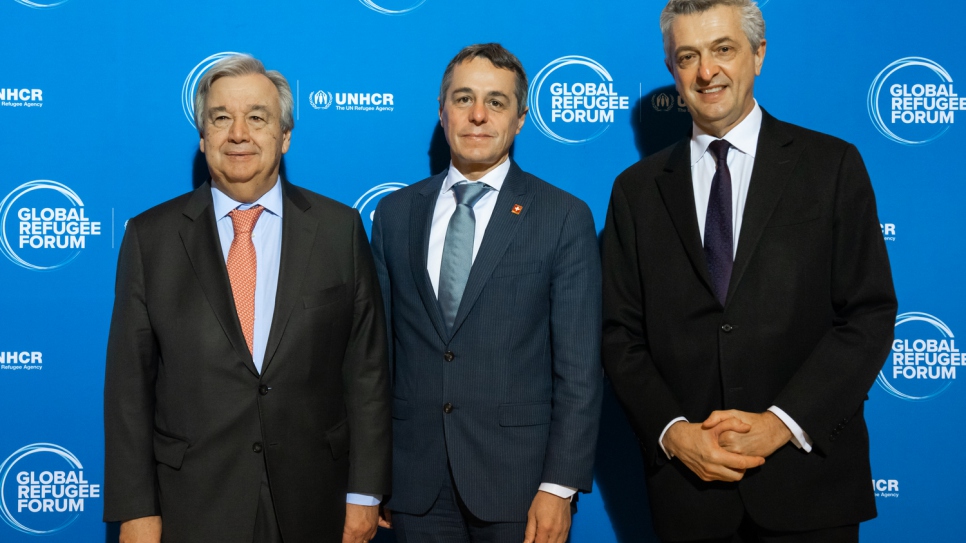
UN Secretary-General Antonio Guterres, Swiss Federal Councillor Ignazio Cassis and UN High Commissioner for Refugees Filippo Grandi at the Global Refugee Forum. © UNHCR/Mark Henley
UN Secretary-General António Guterres is welcomed by forum co-hosts Switzerland and UNHCR, represented here by Ignazio Cassis, Federal Councillor of the Swiss Confederation, and UN High Commissioner for Refugees Filippo Grandi.

Pakistan Prime Minister Imran Khan is greeted by UN High Commissioner for Refugees Filippo Grandi and Deputy High Commissioner Kelly Clements. © UNHCR/Andrew McConnell
Pakistan is a major refugee host country, currently home to more than 1.4 million registered Afghan refugees, and a co-convenor of the Forum. The country's President Imran Khan arrived at the Palais earlier this morning ahead of his speech to the plenary.
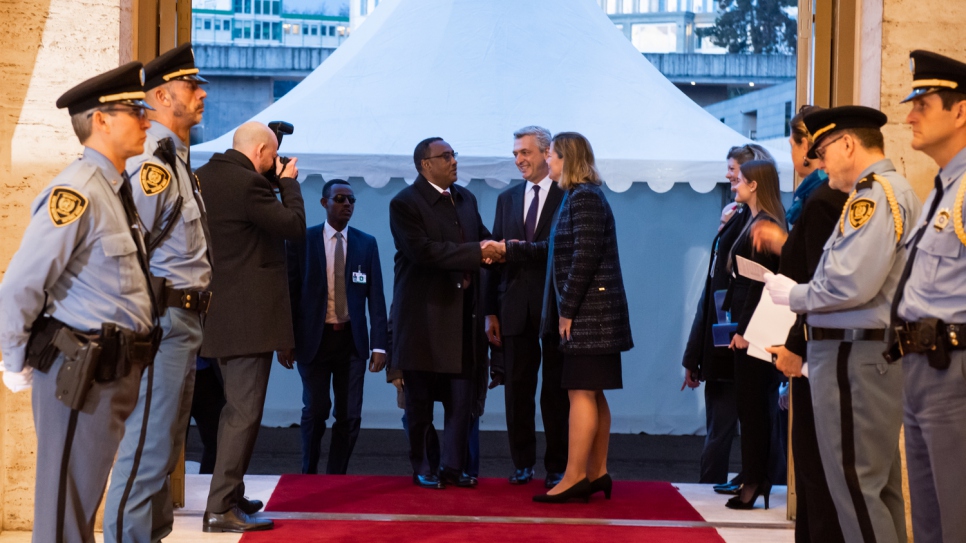
Ethiopian Deputy Prime Minister Demeke Mekonnen arrives for the Global Refugee Forum. © UNHCR/Steve Forrest
Ethiopia has a long history of hosting refugees and maintaining an open door policy for those seeking asylum inside its territory, and is also a Forum co-convenor. The country is represented at the event by Deputy Prime Minister Demeke Mekonnen.

UNHCR High Commissioner for Refugees Filippo Grandi with Carlos Alvarado Quesada, President of Costa Rica. © UNHCR/Steve Forrest
Costa Rica's President Carlos Alvarado Quesada called for a greater commitment to burden sharing and multilateralism to assist the forcibly displaced at a session yesterday on displacement in Central America. Here he is with UNHCR chief Filippo Grandi.
Common goals: refugee football tournament kicks off

Refugees team up with local players for an indoor football tournament as part of the Global Refugee Forum. © UNHCR/Mark Henley
Refugees and locals teamed up for a football tournament in Geneva to show the power of the beautiful game in bringing people together.
Over 30 refugee footballers living in Europe and from around the globe played in teams with local Swiss players as the Global Refugee Forum kicked off.
The tournament was hosted by the International School in Geneva and featured refugees from sixteen countries. Former Swiss international Patrick Muller presented the winners trophy.
Yusuf Farah, one of the tournament referees, comes from the city of Leuven in Belgium and brought 10 refugee footballers to the tournament. He works for the OHL football club refugee team, which features over 12 different nationalities playing in the city. The team contains more than 20 refugees who train and play with local Belgians. It is funded by the local authority and national social services and also gives refugees access to Flemish classes.
⚽Goal! ⚽
— UNHCR, the UN Refugee Agency #RefugeeForum (@Refugees) December 16, 2019
Here's a fantastic display of the unifying power of sport!
On the first evening of the Global #RefugeeForum, refugee athletes team up with players from local clubs in Geneva for a solidarity match. Comment below with your message of support! pic.twitter.com/cvB4iBzAKF
“The team helps with refugee integration on the field. We have a lot of young single male refugees and this helps them to get to know other people and the language. It also gives them a structure to their lives which is really positive”
Mahdi Alfarra is a refugee living in Belgium and came to the club with qualifications in physiotherapy that weren’t recognized by Belgium. Through their connections the club helped him convert his qualifications and he is now working with the team as a physiotherapist on a full-time basis and also with another lower-league team in Belgium.
“Without the club it would have been really difficult to become a physiotherapist again in Belgium. They pushed for me to be given the opportunity and thanks to them I am living football every day."
To see updates from Day 1, please visit: Live blog: Global Refugee Forum — Day 1
For more information, please visit the Global Refugee Forum web page
For a complete list of pledges at the Global Refugee Forum, see the dashboard here.
